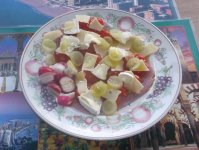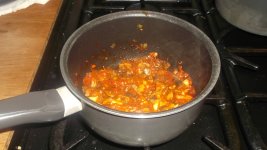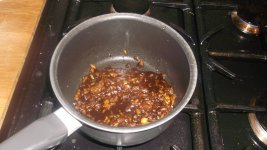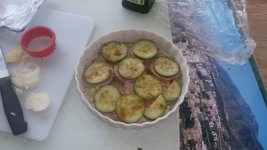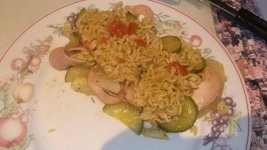tantric
Member
African Cuisine for Southerners
Please note that 'Southern' is a state of mind, not a color.
If you're from the South and interested in African cuisine I have good news - you've been eating it your whole life. In a paltry, attenuated form, true, but okra, black eyed peas, sweet potatoes, cowpeas, watermelons and other melons, bananas, corn AKA mealies, greens and peanuts are all staples across the continent. Yes, Africa is a continent with thousand of different cultures, but the parts connected to the South are those that were involved in the Atlantic slave trade - the Kongo and West Africa. Not all of these foods are native to Africa, some have basically replaced similar veggies that were less amendable to cultivation.
African cuisine use those basic foods and combines them in new ways, along with adding other new foods. Consider Sukuma Wiki, which is Swahili for 'get through the week', mixed greens, whatever you have, along with tomatoes, onions and spices. Try it with garlic, lime juice and the contents of a tea bag or a bit of tamarind paste. Every mother has her own way of cooking it, of course.
Traditional greens include okra leaves, sweet potato leaves, taro leaves - yes, elephant ear plant leaves, mustard, swiss chard, pumpkin leaves, turnip greens, collards and kale, but don't let that stop you - Sukuma Wiki is about getting through the week, in style. I suggest spinach, collards and fresh basil.
If there is one dish that might be considered pan-African (haha), it would be Groundnut Stew. The basic idea is a stew thickened with peanut butter and sometimes coconut milk, spiced hot with chili and/or curry. Weird? It is *fantastic*.
"...'country-chop'...is chicken curry or 'groundnut stew' or 'palm-oil chop'. The main dish, basically chicken, swims in pungent juices and comes with a heaped platter of rice. These nobly centre a table spread with saucered 'gages' [garnishes]: chopped tomatoes, onions, bananas (all both raw and cooked), pineapple, grapefruit, tangerine, prawns and shredded coconut, okra, groundnuts (whole and crushed), powdered ginger, stink-fish, red and green peppers, and chutney -- with a big bowl of cold, astringent fruit salad afterwards to refresh the heated palate. Such is West Africa's own colorful ceremonial contribution to the week's bill of fare; a meal usually preceded by pink gins and washed down with ice-cold beer and best taken with friends at leisure and slept off in the late afternoon of a non-working day. It is the calorie-crammed Coaster meal which pleases not only the formal luncheon party but its servitors and any hangers-on who may follow the rich hot scents to the cookhouse door." -In Black Man's Palaver (Jonathan Cape, London, 1958), Isobel Ryan describes "Chop", prepared by a hired cook, as a tradition among expatriates
You need all the good southern stuff, plus a bit more. Two sweet potatoes, a cup of chopped okra, a cup/can of black-eyed peas, tomatoes, tomato paste, greens (a can of spinach or equivalent fresh), and two green plantains or bananas, chili peppers (I use Sriracha) and red curry powder, if you like.
Peel and chop the sweet potatoes, bite sized cubes. Peel the plantains (cut it with a knife on the inside curve and open it) and cut into 1/2" slices. Boil these together until the sweet potatoes are tender. You should have just enough liquid left to cover the veggies.
Combine a can of tomato paste with half a cup of peanut butter. Add the spices and a diced onion (a strong one, no sweet onions) and enough liquid to cover it (try lime juice), then puree it in a blender. Transfer to a sauce pan and let it cook down.
Add your greens to the sweet potatoes and plantains - if they're fresh, do it while the water is still hot and let them wilt. Pour in the sauce and add the rest of the veggies, okra last, and bring it back to a simmer. The okra will thicken the stew when it cools.
That's the basic - for say, a Gambian fish stew, called Domoda, use sweet potatoes, plantains and pumpkin or winter squash, omit the other veggies and add some shredded frozen fish. I used tilapia filets from Audi's (I'm normally vegan, but I make exceptions). For the east African version, well, we need to talk goat.
You can't do anything in (traditional) Africa unless you first procure, butcher and spit roast a goat, which is shared by all involved in the anything you're to be doing. It's very civilzed, except to the goat. Notice all the goat farms popping up everywhere? Yeah. I'm vegan and I'm telling you goat is tasty. Or you can buy it at the Mexican carniceria. Cut the meat into small cubes and marinate in a mixture of lime and onion juice. It's best if you grill the goat meat, then add it on top of the stew.
Don't forget the grits. In Swahili, they are 'ugali' and they are cooked until solid and sliced like bread.
Please note that 'Southern' is a state of mind, not a color.
If you're from the South and interested in African cuisine I have good news - you've been eating it your whole life. In a paltry, attenuated form, true, but okra, black eyed peas, sweet potatoes, cowpeas, watermelons and other melons, bananas, corn AKA mealies, greens and peanuts are all staples across the continent. Yes, Africa is a continent with thousand of different cultures, but the parts connected to the South are those that were involved in the Atlantic slave trade - the Kongo and West Africa. Not all of these foods are native to Africa, some have basically replaced similar veggies that were less amendable to cultivation.
African cuisine use those basic foods and combines them in new ways, along with adding other new foods. Consider Sukuma Wiki, which is Swahili for 'get through the week', mixed greens, whatever you have, along with tomatoes, onions and spices. Try it with garlic, lime juice and the contents of a tea bag or a bit of tamarind paste. Every mother has her own way of cooking it, of course.
Traditional greens include okra leaves, sweet potato leaves, taro leaves - yes, elephant ear plant leaves, mustard, swiss chard, pumpkin leaves, turnip greens, collards and kale, but don't let that stop you - Sukuma Wiki is about getting through the week, in style. I suggest spinach, collards and fresh basil.
If there is one dish that might be considered pan-African (haha), it would be Groundnut Stew. The basic idea is a stew thickened with peanut butter and sometimes coconut milk, spiced hot with chili and/or curry. Weird? It is *fantastic*.
"...'country-chop'...is chicken curry or 'groundnut stew' or 'palm-oil chop'. The main dish, basically chicken, swims in pungent juices and comes with a heaped platter of rice. These nobly centre a table spread with saucered 'gages' [garnishes]: chopped tomatoes, onions, bananas (all both raw and cooked), pineapple, grapefruit, tangerine, prawns and shredded coconut, okra, groundnuts (whole and crushed), powdered ginger, stink-fish, red and green peppers, and chutney -- with a big bowl of cold, astringent fruit salad afterwards to refresh the heated palate. Such is West Africa's own colorful ceremonial contribution to the week's bill of fare; a meal usually preceded by pink gins and washed down with ice-cold beer and best taken with friends at leisure and slept off in the late afternoon of a non-working day. It is the calorie-crammed Coaster meal which pleases not only the formal luncheon party but its servitors and any hangers-on who may follow the rich hot scents to the cookhouse door." -In Black Man's Palaver (Jonathan Cape, London, 1958), Isobel Ryan describes "Chop", prepared by a hired cook, as a tradition among expatriates
You need all the good southern stuff, plus a bit more. Two sweet potatoes, a cup of chopped okra, a cup/can of black-eyed peas, tomatoes, tomato paste, greens (a can of spinach or equivalent fresh), and two green plantains or bananas, chili peppers (I use Sriracha) and red curry powder, if you like.
Peel and chop the sweet potatoes, bite sized cubes. Peel the plantains (cut it with a knife on the inside curve and open it) and cut into 1/2" slices. Boil these together until the sweet potatoes are tender. You should have just enough liquid left to cover the veggies.
Combine a can of tomato paste with half a cup of peanut butter. Add the spices and a diced onion (a strong one, no sweet onions) and enough liquid to cover it (try lime juice), then puree it in a blender. Transfer to a sauce pan and let it cook down.
Add your greens to the sweet potatoes and plantains - if they're fresh, do it while the water is still hot and let them wilt. Pour in the sauce and add the rest of the veggies, okra last, and bring it back to a simmer. The okra will thicken the stew when it cools.
That's the basic - for say, a Gambian fish stew, called Domoda, use sweet potatoes, plantains and pumpkin or winter squash, omit the other veggies and add some shredded frozen fish. I used tilapia filets from Audi's (I'm normally vegan, but I make exceptions). For the east African version, well, we need to talk goat.
You can't do anything in (traditional) Africa unless you first procure, butcher and spit roast a goat, which is shared by all involved in the anything you're to be doing. It's very civilzed, except to the goat. Notice all the goat farms popping up everywhere? Yeah. I'm vegan and I'm telling you goat is tasty. Or you can buy it at the Mexican carniceria. Cut the meat into small cubes and marinate in a mixture of lime and onion juice. It's best if you grill the goat meat, then add it on top of the stew.
Don't forget the grits. In Swahili, they are 'ugali' and they are cooked until solid and sliced like bread.








